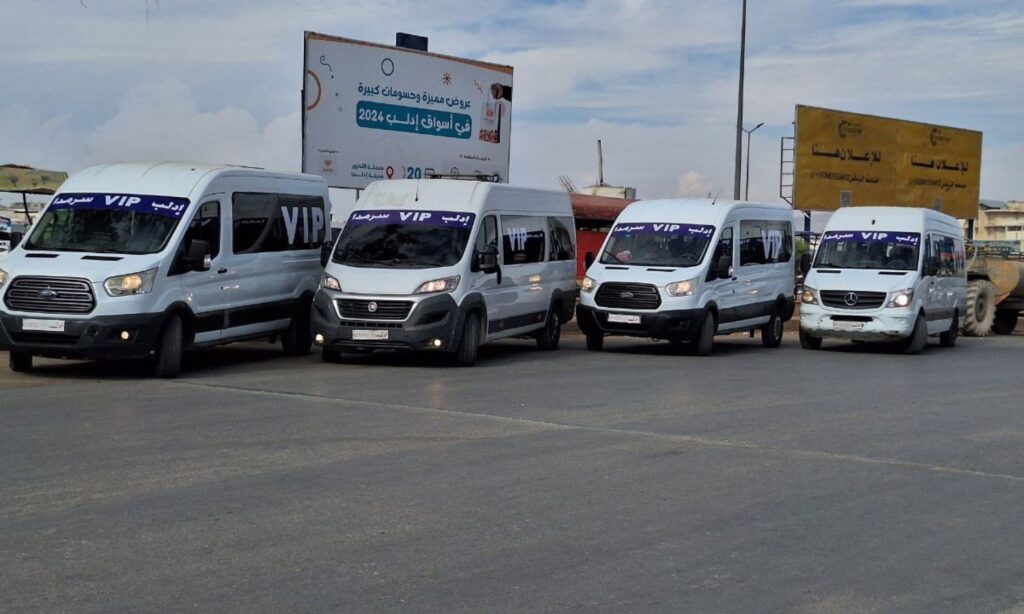Idlib – Samah Alloush
The increase in fuel prices in Syria, along with the residents’ desire to visit their relatives and move between provinces, has led to a rise in transportation costs, creating a new obstacle for many displaced individuals seeking to return to their cities and towns and transport their furniture and belongings after Syria was liberated from the Assad regime, and after all the barriers that had kept them away from their homeland were removed.
According to Enab Baladi‘s monitoring of fuel prices in the local market in Idlib, the price of a liter of European gasoline reached 1.294 US dollars (equivalent to 45 Turkish lira or 50,014 Syrian pounds), and European diesel costs 1.069 dollars (equivalent to 37 Turkish lira).
As for improved diesel, its liter price was $0.68, but it is not available in the market, so drivers rely on the more expensive European fuel, which explains the increase in transportation fees.
High costs… No financial capacity
After struggling and asking multiple drivers, Amal Hawas (40 years old) was unable to transport her household items from Idlib to her city of Hama, from which she had been displaced for years.
She told Enab Baladi that she could not transport the furniture, which includes kitchen tools, dishes, a refrigerator, a washing machine, a gas stove, a bedroom, and some mattresses and pillows, because the average cost for the move from Idlib to Hama is $175.
Her husband could not afford the shipping costs, as he works as a barber, and his income does not allow for such expenses. He decided to sell the furniture in Idlib after contacting specialized transport companies and inquiring about costs.
In addition to the transport fees, there are the labor costs, which would double the amount, considering they were living in an apartment on the seventh floor without an elevator. In exchange, he plans to buy used furniture in Hama to save on those costs.
Aisha al-Madani (52 years old), a displaced person from the Damascus countryside, managed to secure the transportation costs from Idlib through her brother in Germany, as she could not afford the expenses herself.
She mentioned that she postponed her return until her daughter finishes the public secondary school certificate exam.
Salim al-Saleh (50 years old), a moving truck driver with specialized workers for wrapping and transporting furniture safely, told Enab Baladi that moving a complete household furniture requires at least three or four workers at a cost that could reach $50 for ground floor moves, increasing with higher floors.
Payments in dollars
There is no fixed fare to determine transportation costs; they vary based on distance or the size of the furniture, according to Abdul Hamid Numan (42 years old), who owns a transport vehicle and operates in the city of Idlib.
He stated that requests for transportation have increased between Syrian provinces after the fall of the Syrian regime. The average cost for transporting a complete household furniture from Idlib to Aleppo is $75.
The transportation fare from Idlib to the city of Hama ranges from $150 to $200, to Homs it costs $225, while to the capital Damascus, it can reach between $250 to $300, and to Daraa between $300 and $350. These are approximate fares and do not include the costs for transport workers.
For individual transport fares, the cost per passenger from Idlib to Aleppo is $2, to Hama is $4, to Homs is $7, and to Damascus is $8.5.
These fares are considered high compared to the living and economic conditions in northern Syria, where the daily wage for a laborer barely reaches $5.
The Syria Response Coordination Group (SRCG) team working in northern Syria had previously called on all humanitarian organizations to expedite humanitarian response efforts for the displaced until these families can return to their areas.
The team urged humanitarian organizations to unite efforts and develop the necessary plans to enter new areas for humanitarian response to residents and new arrivals in those regions.
Limited assistance
After searching for organizations previously active in northern Syria, or even volunteer teams concerned with alleviating transportation costs for residents, Enab Baladi did not report any efforts in this regard on the ground.
The effort was limited to individual initiatives by some expatriates abroad, as stated by driver Omar from Idlib countryside.
He mentioned that he worked to transport furniture for some families to Homs after being contacted by individuals who gathered amounts to cover the costs for their low-income relatives in northern Syria.
Despite the majority of displaced individuals wanting to return, there are still obstacles preventing them. Most of their villages and towns have been almost completely destroyed, lacking essential services such as water, electricity, health care, and internet access.











